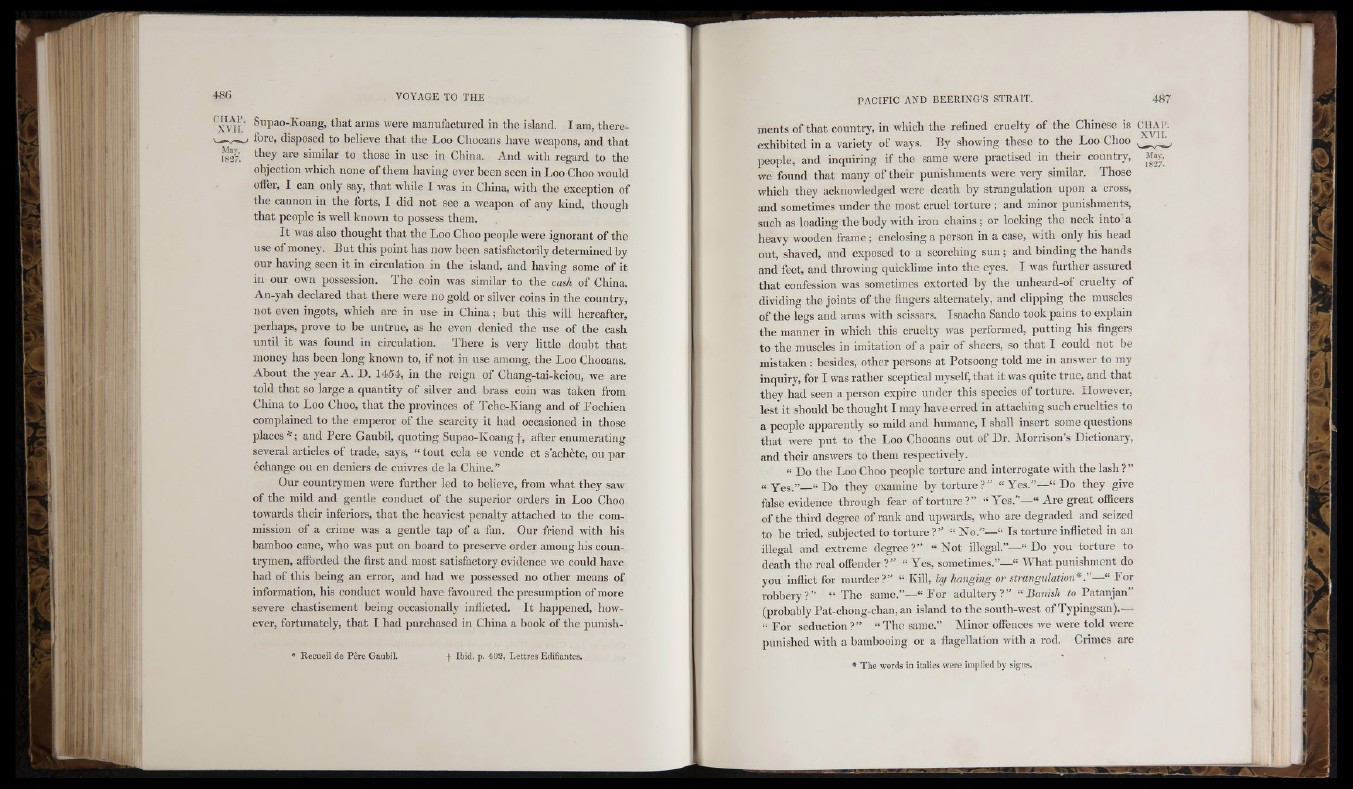
*XVli'.' that arms rvere manufactured in the island. I am, there-
1 ii ii i to May,
MG'
ll-'i
1 7 !,
i i i i i
1827.
, fore, disposed to believe that the Loo Chooans have weapons, and that
they are similar to those in use in China. And with regard to the
objection which none of them having over been seen in Loo Choo would
offer, I can only say, that while 1 was in China, with the exception of
the cannon in the forts, I did not see a weapon of any kind, though
that people is ivell known to possess them.
It was also thought that tbe Loo Cboo people were ignorant of tbe
use of money. But this point has nmv been satisfactorily determined by
our having seen it in circulation in the island, and having some of it
in our own possession. The coin was similar to the cash of China.
An-yah declared that there were no gold or silver coins in the country,
not even ingots, wbicb are in use in China ; but this will hereafter,
perhaps, prove to be untrue, as he even denied the use of the cash
until it was found in circulation. There is very little doubt that
money has been long known to, if not in use among, the Loo Chooans.
About the year A. D. 1454, in the reign of Cbang-tai-keiou, we are
told that so large a quantity of silver and brass coin was taken from
China to Loo Choo, that the provinces of Tche-Kiang and of Bochien
complained to the emperor of the scarcity it had occasioned in those
places*; and Pere Gaubil, quoting Supao-Koangf, after enumerating
several articles of trade, says, “ tout cela se vende et s’achète, ou par
échange ou en deniers de cuivres de la Chine.”
Our countrymen Avere further led to believe, from what they saw
of the mild and gentle conduct of the superior orders in Loo Choo
towards tbeir inferiors, that the heaviest penalty attached to the commission
of a crime Avas a gentle tap of a fan. Our friend with his
bamboo cane, Avho was put on board to preserve order among his countrymen,
afforded the first and most satisfactory evidence we could have
had of this being an error, and had we possessed no other means of
information, his conduct would have favoured tbe presumption of more
severe chastisement being occasionally inflicted. It happened, however,
fortunately, that I had purchased in China a book of tbe punish-
' Recue il de P è re Gaubil. f Ibid. p. 4.02, L e ttre s Edifiantes.
ments of that country, in which the refined cruelty of the Chinese is CU.y^>.
exhibited in a variety of ways. By showing these to the Loo Choo
people, and inquiring if the same Avere practised in their country,
.Mav.
1827.
Ave found that many of their punishments Avere very similar. Those
which they acknoAvledged were death by strangulation upon a cross,
and sometimes under the most cruel torture ; and minor punishments,
such as loading the body Avith iron chains; or locking the neck into a
heavy wooden frame; enclosing a person in a case, Avith only his head
out, shaved, and exposed to a scorching s u n ; and binding the hands
and feet, and throwing quicklime into the eyes. I was further assured
th a t confession Aims sometimes extorted by the unheard-of cruelty of
dividing tbe joints of tbe fingers alternately, and clipping the muscles
of the legs and arms Avith scissars. Isaacha Sando took pains to explain
tbe manner in AA'bich tbis cruelty AA'as performed, putting his fingers
to the muscles in imitation of a pair of sheers, so th a t I could not be
mistaken: besides, other persons at Potsoong told me in answer to my
inquiry, for I was rather sceptical myself, that it Avas quite true, and th a t
they had seen a person expire under tbis species of torture. HoAvever,
lest it should be thought I may have erred in attaching such cruelties to
a people apparently so mild and humane, I shall insert some questions
th a t Avere p u t to the Loo Chooans out of Dr. Morrison’s Dictionary,
and tbeir ansAvers to them respectively.
“ Do the Loo Cboo people torture and interrogate Avith the lash ?”
“ Yes.”—“ Do they examine by torture?” “ Yes.”—“ Do they give
false evidence through fear of torture?” “ Yes.”—“ Are great officers
of tbe third degree of rank and upAvards, aa bo are degraded and seized
to be tried, subjected to torture?” “ No.”—“ Is torture inflicted in an
illegal and extreme degree?” “ Not illegal.”—“ Do you torture to
death tbe real offender ?” “ Yes, sometimes.”—“ What punishment do
you inflict for murder?” “ Kill, by hanging or strangulation‘s —“ For
robbery?” “ The same.”—“ For adultery?” “ Banish to Patanjan”
(probably Pat-cbong-cban, an island to tbe south-Avest o f ’Fypingsan).—
“ For seduction?” “ Tbe same.” Minor offences Ave AA-ere told Avere
punished Avitb a bambooing or a flagellation Avith a rod. Crimes are
* T h e words in italics we re implied by signs.